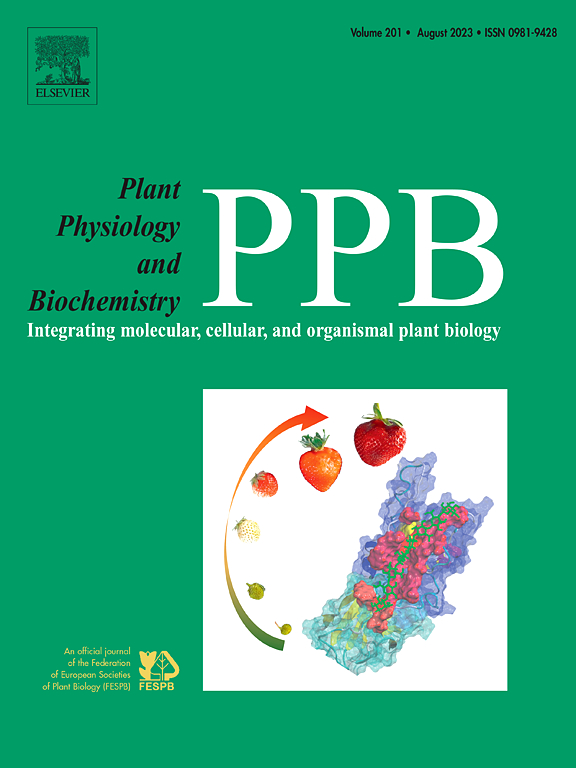pbhlh58通过调节丰塘李蔗糖合酶4正向调节蔗糖积累。
IF 5.7
2区 生物学
Q1 PLANT SCIENCES
引用次数: 0
摘要
含糖量是决定水果品质的重要因素。丰塘李(Prunus salicina Lindl.)具有较高的可溶性糖含量,其蔗糖合成酶4 (PsSUS4)是蔗糖积累的控制步骤。然而,PsSUS4在这种高糖李子中产生蔗糖的转录机制尚不清楚。本研究通过转录组数据和qRT-PCR验证,鉴定出bHLH转录因子pbhlh58与PsSUS4表达和果实蔗糖含量呈正相关。进一步的酵母单杂交和双荧光素酶实验证实pbhlh58通过特异性结合其启动子作为PsSUS4的转录激活因子。通过短暂过表达和基因沉默来调控果实中PsSUS4的表达,导致PsSUS4的表达和蔗糖积累发生显著变化。此外,还发现pbhlh58和PsSUS4的表达水平受到乙烯的正调控,并伴随着果实中糖积累的增加。上述结果揭示了pbhlh58 - pssus4模块介导丰塘李糖积累的新机制,为今后果实品质改良提供了新的思路。本文章由计算机程序翻译,如有差异,请以英文原文为准。
PsbHLH58 positively regulates sucrose accumulation by modulating Sucrose synthase 4 in 'Fengtang' plum (Prunus salicina Lindl.)
Sugar content is an important factor that largely determines fruit quality. 'Fengtang' plum (Prunus salicina Lindl.) is recognized for its high soluble sugar content, and the Sucrose synthase 4 (PsSUS4) functions as the controlling step in sucrose accumulation. Nevertheless, the transcriptional mechanism of PsSUS4 underlying sucrose production in this high-sugar plum remains unclear. In this work, a bHLH transcription factor PsbHLH58 was identified to be positively correlated with PsSUS4 expression and fruit sucrose content based on the transcriptome data and qRT-PCR validation. Further yeast one-hybrid and dual-luciferase assays confirmed that PsbHLH58 acts as a transcriptional activator of PsSUS4 via specifically binding to its promoter. Manipulation of the PsbHLH58 expression in fruits through transient overexpression and gene silencing resulted in significant corresponding changes in PsSUS4 expression and sucrose accumulation. In addition, it was also found that the expression levels of PsbHLH58 and PsSUS4 are positively regulated by ethylene, accompanied by an increased sugar accumulation in the fruits. Consequently, these results demonstrated a novel mechanism involving the PsbHLH58-PsSUS4 module that mediates the sugar accumulation in 'Fengtang' plum and provided a new insight into the future fruit quality improvement.
求助全文
通过发布文献求助,成功后即可免费获取论文全文。
去求助
来源期刊
CiteScore
11.10
自引率
3.10%
发文量
410
审稿时长
33 days
期刊介绍:
Plant Physiology and Biochemistry publishes original theoretical, experimental and technical contributions in the various fields of plant physiology (biochemistry, physiology, structure, genetics, plant-microbe interactions, etc.) at diverse levels of integration (molecular, subcellular, cellular, organ, whole plant, environmental). Opinions expressed in the journal are the sole responsibility of the authors and publication does not imply the editors'' agreement.
Manuscripts describing molecular-genetic and/or gene expression data that are not integrated with biochemical analysis and/or actual measurements of plant physiological processes are not suitable for PPB. Also "Omics" studies (transcriptomics, proteomics, metabolomics, etc.) reporting descriptive analysis without an element of functional validation assays, will not be considered. Similarly, applied agronomic or phytochemical studies that generate no new, fundamental insights in plant physiological and/or biochemical processes are not suitable for publication in PPB.
Plant Physiology and Biochemistry publishes several types of articles: Reviews, Papers and Short Papers. Articles for Reviews are either invited by the editor or proposed by the authors for the editor''s prior agreement. Reviews should not exceed 40 typewritten pages and Short Papers no more than approximately 8 typewritten pages. The fundamental character of Plant Physiology and Biochemistry remains that of a journal for original results.

 求助内容:
求助内容: 应助结果提醒方式:
应助结果提醒方式:


